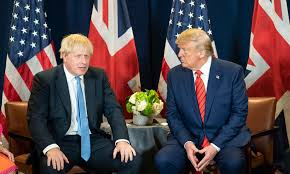BoJo versus Trump on Climate
Legal Planet: Environmental Law and Policy 2019-12-16

Boris Johnson is like Trump in many ways, including a casual disregar for truth, but they’re not alike on climate change. Right after his victory, Johnson renewed his pledge to make the UK carbon-neutral by 2050. He called for “colossal new investments. . . to make this country the cleanest, greenest on earth, with the most far-reaching environmental programme.”
Like Trump in 2016, Johnson enters office with firm control of the government, but with minority popular support. Only 43% of the electorate voted Conservative. But the opposition was divided between Labour, the Social Democrats, and the Scottish National Party. As in the U.S., though, it’s not the popular vote that ultimately matters, and the Conservatives won by a landslide in the House of Commons. The other parties took stronger positions on climate change. Thus, if Johnson fails to follow through on his promises — a distinct possibility — he will have no one else to blame. Since Brexit is now a certainty, one important question is how withdrawal from the EU will affect Britain’s climate policies.
The difference between U.S. Republicans and UK Conservatives goes back to Reagan and Thatcher. Reagan was silent about climate change and skeptical of environmental regulation. But as her recent biography documents, Thatcher was a strong proponent of climate action. In a 1990 speech, she said: “The danger of global warming is as yet unseen, but real enough for us to make changes and sacrifices, so that we do not live at the expense of future generations.” She strongly supported the work of the IPCC and the negotiation of the UN Framework Convention on Climate Change. What’s notable is that rather than converging on this issue, the GOP has moved further away from the Conservatives. In 2008, the Republican Presidential candidate called for a national cap-and-trade system for carbon. Within a few years, even admitting the existence of climate change became heresy within the party. Nothing like that has happened in Britain.
Why are the Republicans so different? In an op. ed. last week, Paul Krugman pointed to the influence of big money (in this case, from the oil industry) and a fear that endorsing any government intervention would legitimize Big Government. “Still,” he added, “whatever the short-term political incentives, it takes a special kind of depravity to respond to those incentives by denying facts, embracing insane conspiracy theories and putting the very future of civilization at risk.” I’m not a political scientist, but “depravity” strikes me as an unsatisfactory explanation for political behavior. Yet I’m not sure how to account for the deterioration of Republican views about climate change.
Any explanation has to go beyond climate change. The NY Times reported last June on a study showing that “the Republican Party leans much farther right than most traditional conservative parties in Western Europe and Canada, according to an analysis of their election manifestos.” In fact, according to the study, the GOP “is more extreme than Britain’s Independence Party and France’s National Rally (formerly the National Front), which some consider far-right populist parties.” It’s little wonder that Trump’s best relations internationally are with rightwing authoritarians.
Whatever the reason, the upshot is that in policy terms, Johnson’s victory isn’t really comparable to Trump’s victory in 2016. Brexit is now inevitable and will likely prove profoundly damaging to Britain. Compared to Trump, Johnson seems less motivated by rage though equally unhampered by moral scruples. But at least the British are still apparently not crazy enough to elect someone who thinks climate change is a Chinese hoax.
The post BoJo versus Trump on Climate appeared first on Legal Planet.